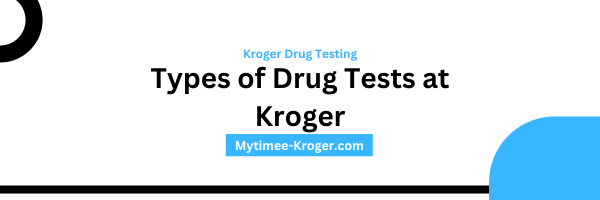Navigating Kroger’s hiring process or workplace policies requires understanding their drug testing procedures. With over 465,000 employees across the United States, Kroger employs strict measures—including pre-employment drug tests and periodic drug tests—to maintain a safe and productive work environment.
This guide provides valuable, actionable information for both potential and existing employees, detailing everything from test types to the substances being screened.
Contents
Understanding Kroger’s Drug Testing Policy
Kroger’s drug testing is designed to ensure a drug-free workplace and involves several key processes:

Pre-Employment Drug Testing (2022)
- Who is Tested:
- Potential employees or job seekers.
- Common roles include cashier and sales associate positions.
- When It Occurs:
- Tests are typically conducted as early as the first interview.
- As noted by former employees, delaying or rescheduling the test is not an option.
- Purpose:
- To screen for non-prescription drugs and controlled substances that could affect workplace safety.
Periodic Drug Testing (As of 2021)
- Who is Tested:
- Existing employees.
- How Testing Occurs:
- Randomly or following an incident such as an accident.
- Targeted tests are conducted if an employee is suspected of drug use.
- Outcome:
A positive test result for any substance may lead to immediate termination.
Kroger Related Posts
- MyTime Kroger Schedule
- Kroger Employee Dress Code
- Kroger VPN Email CDC
- Kroger Weekly Ad
- Does Kroger Pay Better Than Walmart?
- Kroger vs Walmart
- Kroger W2 Form
- Kroger Tuition Reimbursement
- MyLifeatKroger
- Kroger Employee HandBook
- Kroger 401k Plan
- Kroger Employee Discounts
Types of Drug Tests at Kroger
Kroger employs two main testing methods:

Mouth Swab (Saliva) Tests
- Detection Window:
- Most substances can be detected for up to 72 hours after use.
- THC (from marijuana) can be detected for up to 1 week.
- Substances Detected:
- Marijuana (THC)
- Cocaine
- Methamphetamine
- PCP
- Opiates
- Amphetamines
- Benzodiazepines
- Barbiturates
Urine Tests
- A common alternative that screens for the same range of substances.
Key Substances Tested
Kroger’s drug tests are comprehensive. They screen for various commonly abused substances including:
- Marijuana (THC)
- Cocaine
- Methamphetamine
- PCP
- Opiates
- Amphetamines
- Benzodiazepines
- Barbiturates
These tests help ensure that both non-prescription drugs and controlled substances (including those that may come from prescription medications) are identified.
Legal Considerations and State Differences
- Marijuana Legality:
- While the United States has varied laws regarding marijuana use, even in states with legalized recreational use, Kroger may continue testing for THC.
- This is because any form of drug use could be seen as a liability to the company.
- Prescription Medications:
- If you are on medications that contain controlled substances, consult with your medical provider to clarify any potential impacts on your test results.
How to Prepare for a Kroger Drug Test
For Pre-Employment Testing:

- Avoid Drug Use:
- Refrain from using any substances for at least 72 hours before the test (or 1 week for THC).
- Practice Good Hygiene:
- Brush your teeth, use mouthwash, and stay hydrated to ensure a proper sample.
- Plan Ahead:
- Understand that tests occur on a strict schedule—you cannot delay or reschedule.
For Existing Employees:
- Stay Informed:
- Be aware that periodic tests can be conducted randomly or after an incident.
- Know the Consequences:
- A positive result could result in immediate termination.
Conclusion
Understanding every aspect of Kroger’s drug testing policy—from pre-employment procedures to periodic testing—is essential for both potential employees and existing employees. With clear guidelines and actionable steps, you can better prepare for your test, whether you’re applying for a cashier or sales associate position or are already part of the Kroger family.
Stay proactive:
- Avoid using non-prescription drugs and understand the implications of prescription medications that contain controlled substances.
- Remember the detection windows: 72 hours for most drugs and 1 week for THC.
For more insights and updates on workplace policies, subscribe to our blog or reach out to our career support team. Your future at Kroger starts with being informed and prepared!